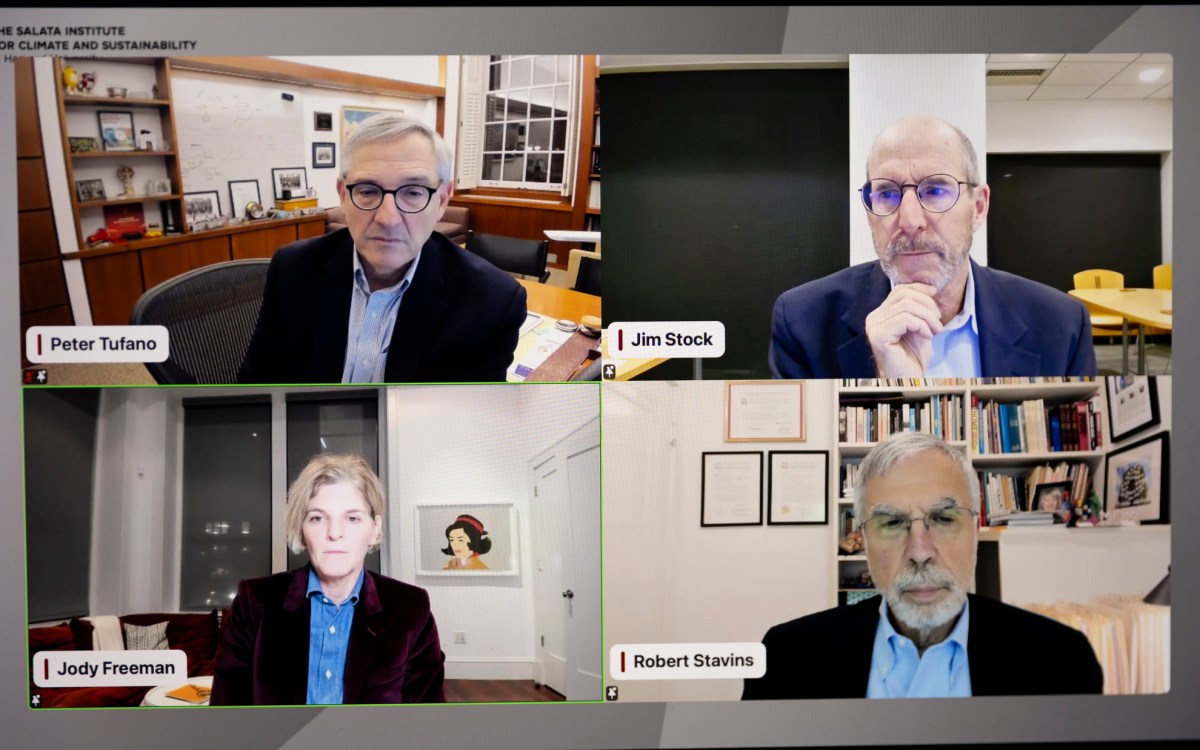Science & Tech
-

A small slice of time
An NSF project builds a special camera to shoot the night sky, light up dark matter, and map the Milky Way
-

Real reason ACL injury rate is higher for women athletes
Study finds flaw in key sports science metric

-

Can people change?
One thing is certain in the new year — we’ll evolve, with or without resolutions. In podcast, experts consider our responsibility.
-

A common sense, win-win idea — and both right, left agree
Poll measures support for revenue-sharing plan on renewable energy that helps states, localities, and environment

-

Climate change experts see dark clouds ahead
Salata Institute panelists predict legal, regulatory setbacks and areas of hope as Trump administration prepares to take over
-

Ever wonder why your dog does this?
Study decodes neural mechanism that causes hairy mammals to shake their fur when wet

-
‘Digital immigrants’ teaching ‘digital natives’
Students coming into universities today are ‘digital natives’ and fundamentally different in their use of technology than the ‘digital immigrants’ who teach them, according to John Palfrey, executive director of…
-
Center for Environment announces new fellows
From Sri Lankan tree frogs and Australian algae to the grasslands of East Africa, the research topics of the latest group of Harvard University Center for the Environment (HUCE) Environmental Fellows represent their diverse backgrounds. The five fellows — from five different countries — will begin their work this September, joining the five fellows from the program’s inaugural group (two of the first seven fellows, Peter Huybers and Valeriy Ivanov, left the program early for faculty positions at Harvard and the University of Michigan, respectively).
-
Making days longer than 24 hours
People at a research hospital in Boston have been living 24-hour, 39-minute days. They were part of an experiment to show that the 24-hour human sleep-wake cycle can be adapted to other biological rhythms like the longer days on Mars.
-
Forty percent of world lacks clean water, solutions sought
The pictures — of children with sunken eyes and shriveled skin; oxen being herded across a river where women clean their clothes and fill their pitchers; an African villager sipping…
-
Ingenious use of indigenous tree reaps award
The jatropha tree is a humble — some might even say homely — plant, with large, maple-like leaves and clusters of inedible fruit that, when mature, look too brown and shriveled to be of much use to anyone. But to thousands of rural eastern and southern Africans, the jatropha is a beautiful thing. It represents hope that they’ll someday have electric lamps to light their homes, refrigerators to keep medicines and vaccines cold in local clinics, and computers and telephones in the schools and orphanages — hope for sustainable energy. And on Tuesday (May 8), the people behind that hope were honored with the 2007 Roy Family Environmental Award in a day of events at the Kennedy School of Government (KSG).
-
Using Spitzer telescope, scientists create first map of extrasolar planet
For the first time, astronomers have created a rough map of a planet orbiting a distant sun-like star, employing a technique that may one day enable mapping of Earth-like worlds. Because the planet just charted is a gas giant and lacks a solid surface, the map shows cloud-top features. Using the Spitzer infrared space telescope, astronomers detected a bright hot spot that is offset from “high noon,” where heating is greatest.
-
Lizards shed light on species diversity
Some people are drawn to majestic racehorses, melodious songbirds, or cuddly puppies. Jonathan Losos has had a lifelong love affair with reptiles.
-
Ancient knowledge
It is 11 a.m. on a sticky tropical Saturday and Ian Graham is lying on his side in the dried grass before a 1,300-year-old stone building in the Maya city…
-
New tourism threatens desert ecosystems worldwide
The Department of Urban Planning and Design at the Harvard Graduate School of Design (GSD) hosted a conference April 4-5 titled “Desert Tourism: Delineating the Fragile Edges of Development.” Panel discussions with leading architects, planners, and developers explored the relationship between tourism, social development, and the architecture and landscapes of arid regions around the world.
-
Libraries, museums meet with IT
The ability to search the actual text of millions of books — instead of just titles or summaries — will change the way students and academics conduct research, revealing a host of new sources invisible to current search methods, a Harvard University Library official working on the Google project said on March 28.
-
Collaboration yields first citywide network of wireless sensors
Harvard University, BBN Technologies, and the city of Cambridge have begun a four-year project to install 100 wireless sensors atop streetlights in Cambridge, Mass., creating the world’s first citywide network of wireless sensors.
-
Warming may not spark tree growth
A bright spot in the gloomy global warming picture has been scientists’ predictions that at least some carbon dioxide will be removed from the atmosphere by a burst of growth from tropical forests. New research from the Arnold Arboretum, however, questions that prediction, finding that trees in two forests on opposite sides of the world have been growing dramatically slower, not faster, as temperatures have risen over the past 20 years.
-
Bradford Cannon
Bradford Cannon, a caring, talented, imaginative plastic surgeon at the Massachusetts General Hospital (MGH) was an acknowledged surgical pioneer for much of the twentieth century. He was born in Cambridge, Massachusetts, in 1907, to Walter Bradford Cannon born in Prairie du Chien, Wisconsin, and Cornelia James Cannon of Cambridge, MA. A year later his father became the Higginson Professor of Physiology at HMS. Brad Cannon graduated from Harvard College in 1929 and Harvard Medical School in 1933.
-
Prof. Lene Hau: Light matters
In 2007, Professor Hau expanded upon her ’05 light-stopping breakthrough by transforming light into matter, and then back again.
-
Undergrads to compete at Programming Contest
A group of Harvard undergraduates will travel to Tokyo to compete in the Association for Computing Machinery’s 31st annual International Collegiate Programming Contest (ACM-ICPC) on March 12-16. More than 6,000 teams, representing 1,756 universities from around the globe, participated in the regional competitions last fall. The top 88 teams earned coveted spots on the 2007 ACM-ICPC World Finals roster. The Harvard team is one of only 20 U.S. teams scheduled to compete in the World Finals.
-
Medieval Islamic architecture presages 20th century mathematics
Intricate decorative tilework found in medieval architecture across the Islamic world appears to exhibit advanced decagonal quasicrystal geometry – a concept discovered by Western mathematicians and physicists only in the 1970s and 1980s. If so, medieval Islamic application of this geometry would predate Western mastery by at least half a millennium.
-
Jackson raps abundance of ‘experts’
In 1973, Shirley Ann Jackson became the first black woman to receive a Ph.D. in physics from the Massachusetts Institute of Technology. Decades – and 38 honorary degrees – later, Jackson is the president of Rensselaer Polytechnic Institute in upstate New York. Her resume includes time as a university researcher (in theoretical elementary particle physics); a corporate scientist (at AT&T Bell Laboratories); and a government regulator (as chairwoman of the U.S. Nuclear Regulatory Commission from 1995 to 1999).
-
Symposium: ‘Will brain imaging be lie detector test of the future?’
For almost a century, one of the staples of crime stories has been the wires, cuffs, and jiggling recording needle of the polygraph machine. In its time, the “lie detector” was hailed as a way to measure the telltale physiological signs of deception, including hard breathing, high blood pressure, and excess perspiration. But in truth, the polygraph was never very accurate, hitting the mark only about 85 percent of the time – and meanwhile creating a lot of “false positives.” As many as 25 percent of people telling the truth during a polygraph exam come out looking like liars.
-
World’s largest oil firm chief touts research to make fossil fuels ‘cleaner’
The head of the world’s largest oil company said that renewable sources can’t meet the world’s growing energy needs so research dollars should be aimed at both developing renewable sources and at making fossil fuels cleaner.
-
Arctic hit by global warming first
Scientists from the eight nations bordering the Arctic recently enlisted representatives of the region’s native peoples to help assess climate change there. What they found put a human face on a debate often involving distant projections and abstract numbers. Less snow, less sea ice, freezing rain in winter, and the appearance of mosquitoes and robins, creatures so foreign the native residents have no word for them.
-
Light and matter united
Lene Hau has already shaken scientists’ beliefs about the nature of things. Albert Einstein and just about every other physicist insisted that light travels 186,000 miles a second in free space, and that it can’t be speeded-up or slowed down. But in 1998, Hau, for the first time in history, slowed light to 38 miles an hour, about the speed of rush-hour traffic.
-
New York artist expresses long passion
They are odds and ends of lives long past, lived in the cold and ice of the world’s polar regions. They are bits and pieces that give a feeling as…
-
‘Usable Knowledge’ Web site delivers research to educators
The Harvard Graduate School of Education on Dec. 6, 2006, launched a new Web site aimed at connecting the research of its faculty with educators in the field. The Usable…
-
Negative vibes from space
Astronomers have discovered the first negatively charged molecule in space, identifying it from radio signals that were a mystery until now. While about 130 neutral and 14 positively charged molecules…
-
Three-dimensional, miniature endoscope opens new diagnostic possibilities
Massachusetts General Hospital (MGH) researchers have developed a new type of miniature endoscope that produces three-dimensional, high-definition images, which may greatly expand the application of minimally invasive diagnostic and therapeutic…
-
Astronomers nab culprit in galactic hit-and-run
The Andromeda galaxy, the closest large spiral to the Milky Way, appears calm and tranquil as it wheels through space. But appearances can be deceiving. Astronomers have new evidence that…
-
DEAS welcomes Harvard astronaut back to Earth
International Space Station designers thought of everything concerning astronaut comfort while sleeping. There are sleeping bags, straps to hold astronauts against the wall, and, according to NASA astronaut Stephanie Wilson, there’s even a strap to hold their heads to the pillow against the weightlessness of space. Wilson, who graduated from Harvard in 1988, returned to campus on Sept. 14 to share her space experiences in an hour-long talk that mixed the technical accomplishments of her space shuttle flight and colorful details of life in space.
-
Sweeping for Thompson Island Hoppers
Education meets hands-on science as roughly 100 Harvard undergraduates fan out from beach to beach collecting insects for a new database of Harbor Island insect life.
-
Visualization Lab provides data in three dimensions
On the second floor of the Peabody Museum, in a darkened room painted flat black, Harvard geologist John Shaw slips on a pair of futuristic goggles as he sits before a 23-foot-wide wrap-around screen.
-
Strange new planet baffles astronomers
Using a network of small automated telescopes known as HAT, Smithsonian astronomers have discovered a planet unlike any other known world. This new planet, designated HAT-P-1, orbits one member of…

